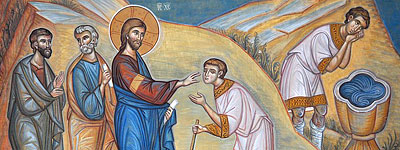

| Previous day | Next day |
| Old Style
May 27
|
Sunday |
New Style
June 9
|
| 6th Sunday of Pascha. Sunday of the Blind Man. Tone 5. | No fast.
|
![]() Hieromartyr Therapontus, priest, of Sardis (3rd c.).
Hieromartyr Therapontus, priest, of Sardis (3rd c.). ![]() Translation of the relics of St. Nilus of Stolobny (1667).
Translation of the relics of St. Nilus of Stolobny (1667). ![]() St. John the Russian, confessor, whose relics are on the island of Euboea (1730).
St. John the Russian, confessor, whose relics are on the island of Euboea (1730).
Virgin-martyr Theodora and Martyr Didymus the Soldier, of Alexandria (304). St. Therapont, abbot, of Belozersk and Mozhaisk (1426). Translation of the relics (1472) of Sts. Cyprian, Photius, and Jonah, metropolitans of Kiev (1472). St. Therapontus, monk of Monza Monastery (Galich) (1597). St. Lazarus the Clarivoyant, hieroschemamonk of Pskov Caves Monastery (1824).
Viliya Icon of the Most Holy Theotokos.
Martyr Julius the Veteran, at Dorostolum in Moesia (ca. 302). St. Bede the Venerable, hieromonk and chronicler, of Wearmouth and Jarrow (735). St. Michael of Parekhi, Georgia (8th c.-9th c.). St. Basil of Khakhuli, son of King Bagrat III of Georgia (11th c.). St. Melangell, virgin hermitess, of Pennant, Wales (ca. 590). Hieromartyr Helladius, bishop (6th c.-7th c.). New Hieromartyr Therapontus, priest, of Sofia (Bulgaria) (1555). Synaxis of the Saints of Carpatho-Russia.
Repose of Blessed Zina of Vetluga (1960).
Thoughts for Each Day of the Year
According to the Daily Church Readings from the Word of God
By St. Theophan the Recluse

Sunday of the Blind Man. [Acts 16:16–34; John 9:1–38]
Simplicity of faith argues with crafty unbelief. Faith, coming to the blind man who received sight, enlightened his mind’s eyes, and he clearly saw the truth. See how everything was logical for him. They ask him: what do you say of Him who gave you sight? He is a prophet, he answered, that is the messenger of God, clothed in miracle-working power. An indisputably true conclusion! But learned erudition does not want to see this trueness and seeks to evade its consequences. However, this being impossible, it approaches unlearned simplicity with the suggestion: give God the praise: we know that this man is a sinner. Simplicity of faith does not know how to connect these concepts—sinfulness and miracle-working, and expresses this openly: Whether he be a sinner or no, I know not: one thing I know, that, whereas I was blind, now I see. What can one say against such deduction? But the logic of the unbelievers is obstinate, and even in the face of obviousness it is not ashamed to affirm that it does not know where he who opened the blind man’s eyes is from. Why herein is a marvellous thing, the sensible logic of faith says to them, that ye know not from whence He is, and yet He hath opened mine eyes. Now we know that God heareth not sinners: but if any man be a worshipper of God, and doeth His will, him he heareth. Since the world began was it not heard that any man opened the eyes of one that was born blind. If this man were not of God, He could do nothing (John 9:17–33). It would seem as though after this nothing remained other than to bow down before the power of such a conclusion. But learned erudition could not stand the sensible logic of faith, and drove it away... Go now, prove the truth of the faith to those whose mind has been corrupted with obstinate unbelief. The unbelievers of all times are cut from the same cloth.
Articles
 Hieromartyr Therapon the Bishop of SardisThe Hieromartyr Therapon, Bishop of Sardis suffered for Christ during the third century (the city of Sardis was in Lydia, Asia Minor). |
 St Photius the Metropolitan of KievSaint Photius, Metropolitan of Kiev and All Russia, was by birth a Greek from the Peloponnesian city of Monembasia (Malbasia). |
 St Jonah the Metropolitan of MoscowSaint Jonah, Metropolitan of Moscow and Wonderworker of All Russia, was born in the city of Galich into a pious Christian family. |
 Venerable Bede, the Church HistorianSaint Bede was a church historian who recorded the history of Christianity in England up to his own time. |
 Sunday of the Blind Man |









